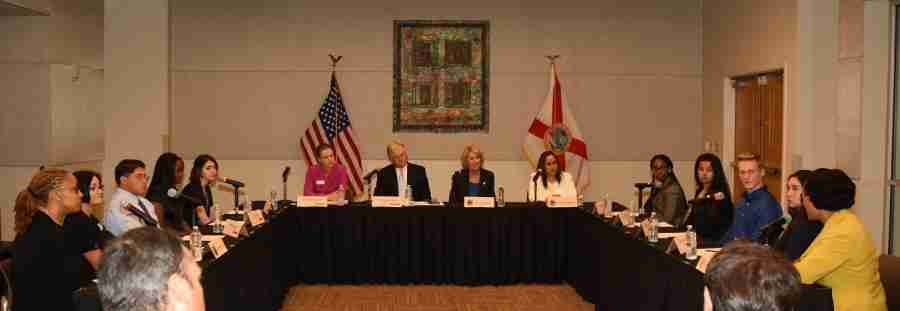What Does Secretary DeVos Think About the Future of the Pell Grant?
March 28, 2017
U.S. Secretary of Education, Betsy DeVos, held a roundtable at Valencia’s Osceola Campus with dual-enrollment students on Friday, March 24. Valencia President Sandy Shugart, was also there to lead the discussion at the roundtable. One of the hot topics was college accessibility, which naturally led to a discussion about economics.
The U.S. Department of Education’s website stresses that a college degree is becoming increasingly more important for financial stability. It states “less than 10 percent of children born in the bottom quartile of household incomes attain a bachelor’s degree by age 25, compared to over 50 percent in the top quartile.”
For dual-enrollment students, this financial issue blocking their route into college is eased by the federal government’s Pell Grants. However, these grants are not offered during the summer. At the roundtable, a student spoke briefly about the Pell Grant, thanking DeVos for the funding he receives to help him in college. DeVos responded to him, “It’s helping a lot of students, for sure.”
After her response, Shugart said, “For many students, it’s crucial that they attend school through summer.” He then asked DeVos what she thinks about a “year round bill” rather than a “traditional semester” one.
“Well, this is a common theme I’ve been hearing,” she states. “I think we need to acknowledge the reality that the needs of students are changing, and the needs of the work force and industry are changing significantly. So we need to think differently about how we help students pursue their education in the way that is going to work best for them and become a lot more flexible.”
Shugart then elaborated on his idea for the Pell Grant being based on credit hours instead of the date the student enters college and his/her expected graduation date. DeVos responded by referring to the federal government attempting to “be a top down, one-size-fits-all solution to everything.” She continued by saying that the federal government should be more “flexible.”
The Republicans have the majority in the federal government currently, and they have voiced their opinions about how much they dislike the idea of the federal government providing Pell Grants to college and university students around the United States. They believe that students, whether they are poor or wealthy, should use loans to help pay for higher education if they need the financial assistance to do so.
Even though DeVos acknowledges that the Pell Grants are helping many students, she dislikes the idea of a “top down, one-size-fits-all” solution. This does not necessarily mean that she thinks students should have to take out student loans, but this does mean that she does not believe that the federal government should be helping students with higher education.
With Trump’s administration and a Republican majority, only time will tell how the Pell Grant will be affected and what financial aid will be provided for students in the bottom socio-economic quartile seeking higher education.




